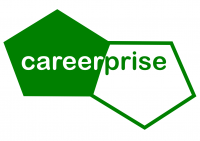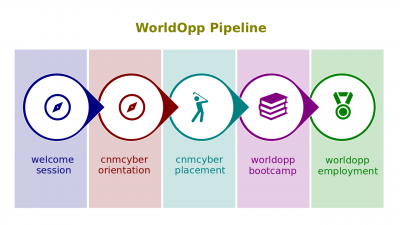Difference between revisions of "Sought Competences"
(→See also) |
|||
| Line 1: | Line 1: | ||
| − | [[Work Competences]]. We are going to discuss competences needed at work, this is the last piece of introduction to employment lecture. Taking a look at the graph on Work Related Competence, it consists of three domains which are Administrative Competence, Occupation Required and Industry Related Competence. | + | [[Work Competences]]. |
| + | |||
| + | [[File:Careerprise td.png|200px|thumb|[[Careerprise]]'s trade mark]][[File:Educaship-pipeline.png|400px|thumb|right|[[WorldOpp Pipeline]]]][[Employment Essentials]] is the first [[presentation]] in the [[Introduction to Employment]] lecture. The lecture itself is the first in [[WorldOpp Orientation]]. Consequently, the ''[[WorldOpp Orientation|Orientation]]'' is the first stage of [[WorldOpp Pipeline]]. | ||
| + | |||
| + | This wikipage presents its full script and those test questions that are related to that presentation. | ||
| + | |||
| + | |||
| + | ==Script== | ||
| + | The video of the presentation is published at https://youtu.be/LJBr1eVsMfQ (5:52). Here is its full text. | ||
| + | |||
| + | ===Overview=== | ||
| + | |||
| + | |||
| + | We are going to discuss competences needed at work, this is the last piece of introduction to employment lecture. Taking a look at the graph on Work Related Competence, it consists of three domains which are Administrative Competence, Occupation Required and Industry Related Competence. | ||
Let`s start with occupation required, for instance an accountant is supposed to know something about accounting, not only know but also practice and be able let`s say to debit, credit accounts and be skilled to do a general ledger and be able to create balance sheet, income statement and so forth. It is not everything you need to know, so occupation requires competence a big chunk but it is not everything. An accountant in aerospace industry accounting there will be slightly different from accounting lets` say in film production. So debit and credits would be treated the same but practices, taxes, expenses can be different so that is why industry related competence comes into play. But even if you know debits and credits, even if you know how expenses are calculated in aerospace industry you still need to know how to read and write, you need something more general. Also known as administrative competence. | Let`s start with occupation required, for instance an accountant is supposed to know something about accounting, not only know but also practice and be able let`s say to debit, credit accounts and be skilled to do a general ledger and be able to create balance sheet, income statement and so forth. It is not everything you need to know, so occupation requires competence a big chunk but it is not everything. An accountant in aerospace industry accounting there will be slightly different from accounting lets` say in film production. So debit and credits would be treated the same but practices, taxes, expenses can be different so that is why industry related competence comes into play. But even if you know debits and credits, even if you know how expenses are calculated in aerospace industry you still need to know how to read and write, you need something more general. Also known as administrative competence. | ||
| Line 12: | Line 25: | ||
With this said, we are ready to jump to Introduction to Recruitment. | With this said, we are ready to jump to Introduction to Recruitment. | ||
| − | |||
| − | |||
| − | |||
| − | |||
| − | |||
| − | |||
| − | |||
| − | |||
| − | |||
| − | |||
| − | |||
| − | |||
| − | |||
| − | |||
===Summary=== | ===Summary=== | ||
Revision as of 15:46, 25 January 2019

Employment Essentials is the first presentation in the Introduction to Employment lecture. The lecture itself is the first in WorldOpp Orientation. Consequently, the Orientation is the first stage of WorldOpp Pipeline.
This wikipage presents its full script and those test questions that are related to that presentation.
Script
The video of the presentation is published at https://youtu.be/LJBr1eVsMfQ (5:52). Here is its full text.
Overview
We are going to discuss competences needed at work, this is the last piece of introduction to employment lecture. Taking a look at the graph on Work Related Competence, it consists of three domains which are Administrative Competence, Occupation Required and Industry Related Competence.
Let`s start with occupation required, for instance an accountant is supposed to know something about accounting, not only know but also practice and be able let`s say to debit, credit accounts and be skilled to do a general ledger and be able to create balance sheet, income statement and so forth. It is not everything you need to know, so occupation requires competence a big chunk but it is not everything. An accountant in aerospace industry accounting there will be slightly different from accounting lets` say in film production. So debit and credits would be treated the same but practices, taxes, expenses can be different so that is why industry related competence comes into play. But even if you know debits and credits, even if you know how expenses are calculated in aerospace industry you still need to know how to read and write, you need something more general. Also known as administrative competence.
Administrative Competence Consists of competence needed to undertake any enterprise efforts, conceptual requirement regardless of specific industry or occupation, It consists of operational competence, interpersonal competence and enterprise competence.
Operational Competence, sometimes it`s called technical or technical skills, it`s now skills and abilities needed to perform most of the jobs which include capacity to read, write, analyze, use computers etc.
Interpersonal Competence, human interpersonal skills, or sometimes people`s skill. It`s now skills and abilities to work with other people individually and in a group. This includes active listening, communicate, understand other`s motivation and so on.
Lastly, Enterprise Competence. Sometimes known as Organization Skills, Conceptual Competence, and this is the knowledge, skills and abilities needed to undertake enterprise efforts as well as to work in and with enterprises. This competence includes capacity to navigate organization and bureaucracies, plan resources and execute regulatory compliance and so on.
With this said, we are ready to jump to Introduction to Recruitment.
Summary
Quiz questions
- Every statement below is split into one true and one false question in the actual exam.
See also
- CNM Digital Essentials. Another presentation of Welcome to Friends Of CNM.
- Friends Of CNM Essentials. Another presentation of Welcome to Friends Of CNM.
